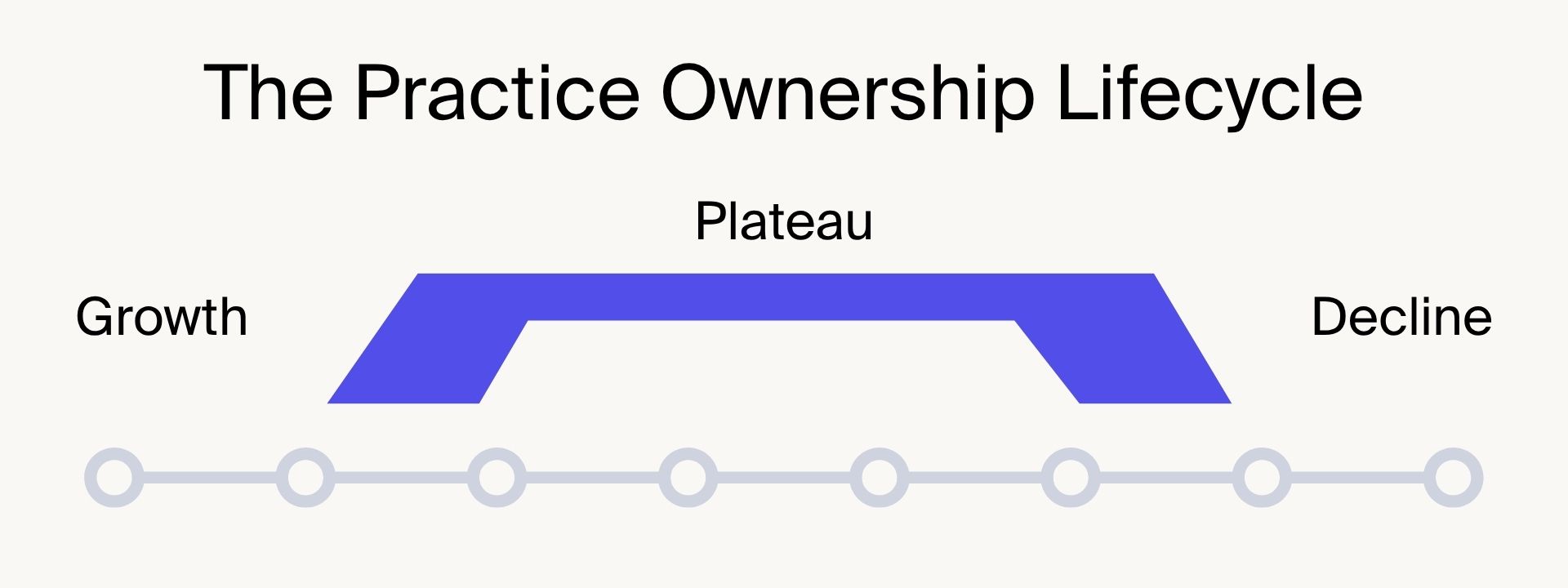When Should I Sell My Dental Practice? A Doctor's Guide to Timing Your Transition

As someone who has worked with hundreds of dentists through their practice transitions, I've learned that the question "When should I sell?" comes up more often than you might think. And it's not just doctors nearing retirement who are asking.
Surprisingly, the answer isn't found in your age or years of practice. Instead, the real answer lies in understanding where you are in the natural lifecycle of practice ownership and planning accordingly. Let me explain …
The Tell-Tale Signs
I've noticed that doctors considering a transition usually cite one or more of these very valid motivations:
- Wanting relief from the stress of feeling like the sole financial engine of the practice
- Wanting to reduce the administrative and management burden
- Seeking better profitability and systems that don’t seem possible in their current practice
- Desiring more time for family, hobbies, or other interests
- Looking for a new challenge or change of pace
- Feeling limited by their current situation running the practice alone
- Facing health concerns that affect their ability to practice
- Frustration with insurance hassles and regulatory pressures
- Planning a relocation
- Preparing for retirement
If any of these resonate with you, it might be time to start exploring your options.
The Practice Ownership Lifecycle
Most dentists follow a predictable pattern throughout their careers, and understanding where you are in this cycle is crucial for timing your transition correctly.

The Growth Phase
Early in your career, you're hungry and motivated. Every new patient feels like a victory. You're constantly looking for ways to grow, improve systems, and build your reputation in the community. The practice is expanding, and you're energized by the challenges and opportunities.
The Plateau Phase
After years of growth, you reach a comfortable cruising altitude. The practice is running well, systems are in place, and you've found your rhythm. This can be a wonderful stage—you're making good money, you know your patients well, and the practice largely runs itself. You're not necessarily looking to make major changes because things are working.
The Decline Phase
This is where many successful dentists find themselves later in their careers. The house is paid off, the kids are through college, and financial pressures have eased considerably. When your personal financial situation stabilizes, it's natural to take your foot off the gas. You might start taking longer vacations, working fewer days, or simply not pushing as hard for growth. You're less hungry than you were in those early years. While this might not bother you too much, you’re really starting to leave a lot of money on the table when you sell if you stay in this phase too long (and ANY time here is too long).
The Critical Timing Decision
Here's what many dentists don't realize:
The best time to sell is during the plateau phase, before you enter the decline phase.
Why? Because practice values are based heavily on the most recent 2-3 years of performance. When buyers and their banks evaluate your practice, they're looking at your current trajectory, not what you accomplished a decade ago.
If your collections have dropped 10-15% over the last few years because you've been taking more time off, that decline will cost you significantly more in reduced sale price than the income you gave up during those relaxed years.
Let's say your practice was collecting $1.2 million annually during your plateau years, but in the last three years it's declined to $1 million as you've stepped back.
That $200,000 reduction in collections could translate to a $350,000+ lower sales price. Plus, some buyers are more wary of practices in any sort of decline, and banks are much more hesitant to lend on practices they perceive to be in decline. Buyers and banks don’t care if you believe the practice could grow significantly if someone put a bit more effort into it. Practices sell on history, not potential!
The Practical Checklist
Before making any big decisions, ask yourself (and your trusted advisors) these crucial questions:
- Can I financially afford to make a change?
- Am I ready to give up some or all control of my practice?
- Does this feel right in my gut?
You need to be able to answer "yes" to all of these for the timing to be right.
The Biggest Misconception: You Don’t Necessarily Need to Stop Practicing
Here's something that might surprise you: selling your practice doesn't always mean you have to stop practicing.
Many doctors assume that selling equals retirement, loss of control, and reduced income. That's simply not true.
In fact, some of the most successful transitions I've seen over the years involve doctors who sell their practices 3-5 years before they're ready to retire. They get to "cash out" on their practice equity while continuing to practice, but without the headaches of managing the business side.
Think about it: when you sell and stay on as an associate, you give up the administrative hassles but keep doing what you love most: treating patients. I’ve always said that the seller makes the best associate.
Don't Wait Too Long
Here's the hard truth: I've seen too many doctors wait too long and receive far less than their practice was worth at its peak.
If you sense that you're moving from the plateau phase toward wanting to slow down—even if that's still years away—that's your signal to start exploring your options. You don't have to act immediately, but having a plan gives you control over your future rather than letting circumstances force your hand.
The Bottom Line
The "right time" to sell isn't about reaching a certain age or practicing for a specific number of years. It's about recognizing where you are in the natural lifecycle of practice ownership and making strategic decisions accordingly.
The doctors who get the best outcomes are those who plan their transitions during their plateau years, while their practices are still strong and growing. They maximize their practice value while still having the option to continue practicing in a less stressful environment.
If you're curious about your options, there's no harm in having a conversation with a trusted professional who specializes in practice transitions. Sometimes just understanding what's possible can help clarify whether now is your time to make a move.
Remember: you've spent decades building something valuable. Make sure you give yourself every opportunity to realize that value while your practice is still at its peak performance.

Ready to Navigate Due Diligence Like a Pro?
If your practice could be worth $1.3M, don't settle for $900K.
Most dentists discover these problems during negotiations—when it's too late to fix them. We're sharing the 10 hidden value killers that cost practice owners hundreds of thousands of dollars in our free guide: "The (Multi-)Million Dollar Practice Exit."







